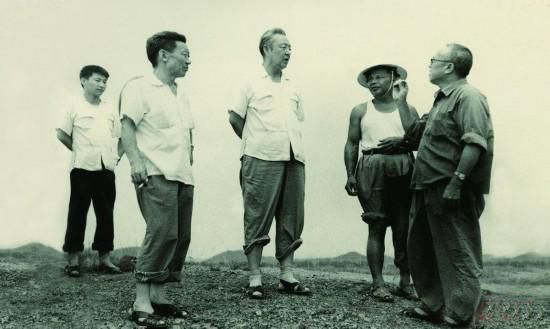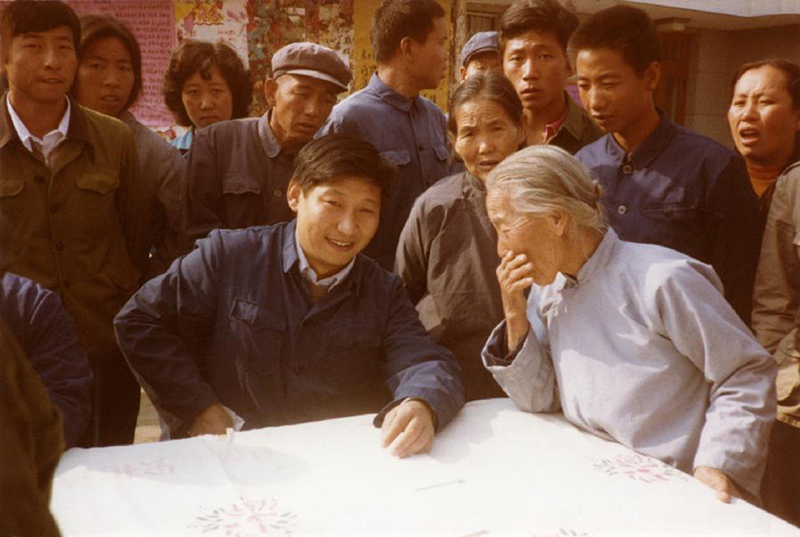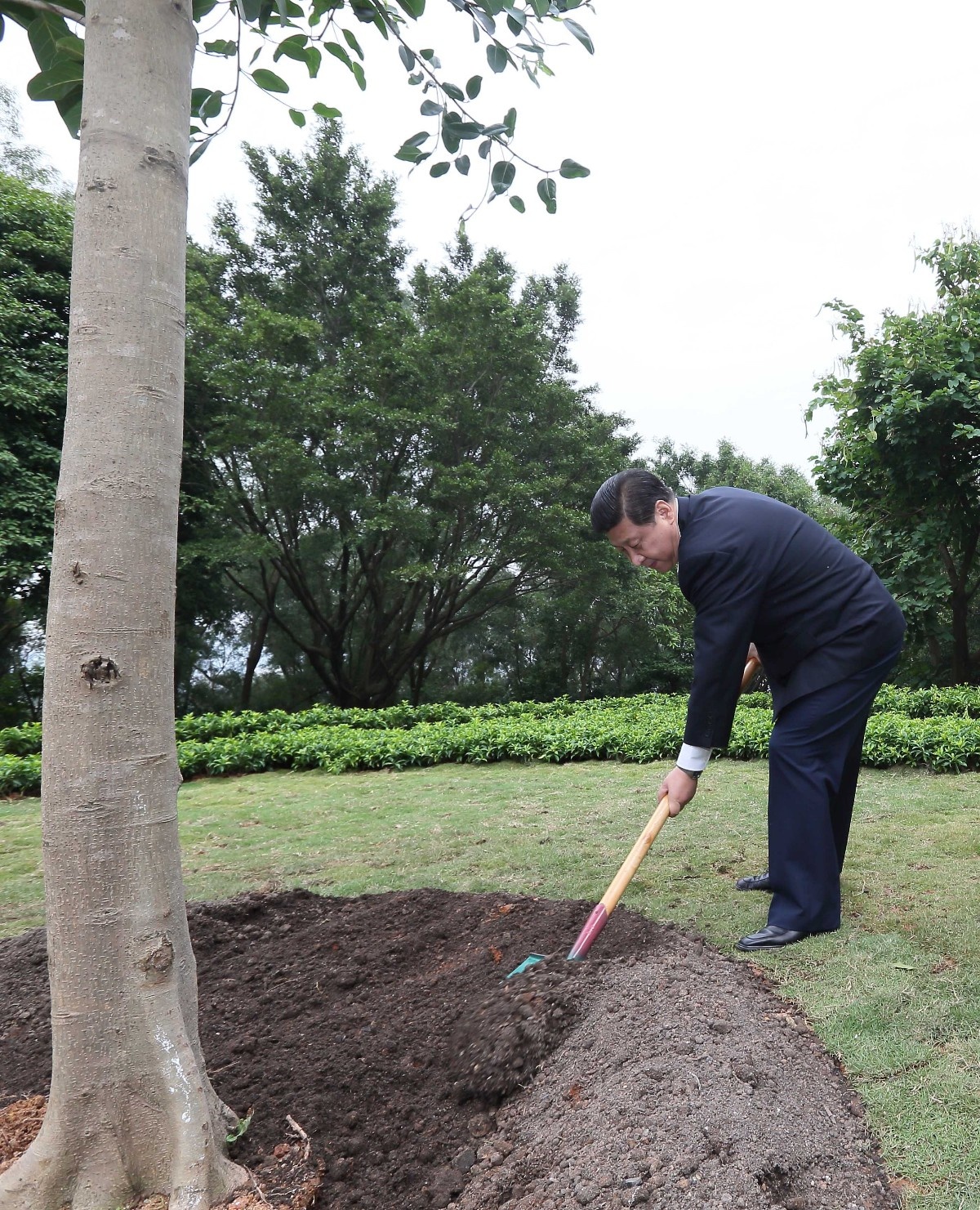
Banyan has amazing vitality. No matter how barren the land is, or even the rocks and cliffs are broken, it can break through the ground and take pride in the sky.
On March 12, 2000, 87 year old Xi Zhongxun and his family planted a banyan tree in the "Orchid Garden", their residence in Shenzhen. Xi Zhongxun said to the staff around him, "I also want to take root in Shenzhen."
As a major pioneer and one of the important founders of Guangdong's reform and opening up, Xi Zhongxun planted this banyan tree to express his wish to take root in the hot land of reform and opening up.
In December 1978, the Third Plenary Session of the Eleventh Central Committee of the Communist Party of China made a historic decision to shift the work center of the Party and the state to economic construction as the center and implement reform and opening up, opening a new historical period of reform and opening up and socialist modernization.
A few months later, Xi Zhongxun, then the first secretary of the CPC Guangdong Provincial Committee, proposed at the Central Working Conference that the Central Committee should give Guangdong more autonomy and take a step forward in the reform and opening up. He said: "Guangdong is close to Hong Kong and Macao, and there are many overseas Chinese. We should make full use of this favorable condition to actively carry out foreign economic and technological exchanges."
This bold proposal was made by Xi Zhongxun after his in-depth research in Guangdong.
In July 1978, Xi Zhongxun went to the countryside for research, and his first stop was Bao'an County. A river runs through Luofang Village and divides the farmland in the village into two parts, half in Guangdong and half in Hong Kong. Xi Zhongxun learned on the spot that the per capita annual income of the villagers of Luofang Village in Guangdong is only 134 yuan, while the per capita annual income of the villagers of Luofang Village in Hong Kong across the river is 13000 yuan.
In Zhongying Street, he saw a huge crowd of people on the Hong Kong side; On the inland side, however, weeds are overgrown and depressed. When he came to the lychee garden, he heard the grower sigh that one pound of lychee sold for only eight cents. He thought for a long time

In August 1978, Xi Zhongxun (third from the left) made a survey in Huiyang, Guangdong. Xi Jinping (first from left), who studied at Tsinghua University, took part in social practice during the summer vacation and went to the countryside with his father.
This summer, Xi Zhongxun ran 23 counties in a row.
After mastering the real situation of Guangdong, Xi Zhongxun proposed a series of groundbreaking reform proposals to the Central Committee, which won the support of the Central Committee. In March 1979, Shenzhen was established. Soon after, Comrade Xi Zhongxun once again proposed to set aside a place for independent management in Shenzhen, Zhuhai and Shantou, an important hometown of overseas Chinese, adjacent to Hong Kong and Macao, as an investment place for overseas Chinese, Hong Kong and Macao compatriots and foreign businessmen. This suggestion has received the attention of the leading comrades of the Central Committee. In August 1980, the Party and the state approved the establishment of special economic zones in Shenzhen, Zhuhai, Shantou and Xiamen.
During more than two years of working in Guangdong, Xi Zhongxun has done a lot of pioneering work.
He led the people of Guangdong to explore the way to adjust the rural economic structure, and put forward that under the premise of ensuring food self-sufficiency, we should give free rein to the development of cash crops, animal husbandry and fishery, and agricultural and sideline products processing and other community enterprises. He also combined Guangdong's geographical advantages adjacent to Hong Kong and Macao, promoted the development of small border trade, introduced Hong Kong businessmen to invest in the establishment of processing plants with supplied materials... A series of innovative initiatives laid the foundation for Guangdong to take the lead in China's reform and opening up.
At the beginning of reform and opening up, his father led the Guangdong people to emancipate their minds and forge ahead with the great practice of reform, which deeply affected Xi Jinping.
In 1982, Xi Jinping took the initiative to apply for local work, leaving the General Office of the State Council and the General Office of the Central Military Commission to take a local post.
During his work in Zhengding, Hebei, facing the problem that most enterprises and units in the county are lack of scientific and technological talents and technical backbones to varying degrees, Xi Jinping proposed nine employment measures after in-depth research, including "boldly employ and widely accept various talents", "allow research projects to fail without accountability, pay salaries, and pay round-trip fares".
The "Nine Talents" involved distribution system, personnel system, grain policy, household registration management and other aspects, which was an ice breaker at that time.

In 1983, Xi Jinping, then Secretary of the CPC Zhengding County Committee in Hebei Province (the front row is in the middle), temporarily set a table on the street to listen to the people's opinions.
During his work in Fujian, Xi Jinping summed up the "Jinjiang experience" after many investigations and proposed the direction of county economic development; Advocate the establishment of "one building" of foreign economy and promote the simplification of administration and decentralization of power; Leading the reform of collective forest right system.
During his work in Zhejiang, Xi Jinping proposed the "August 8th Strategy"; When he arrived in Shanghai, he tried to promote the integration of the Yangtze River Delta... These reform methods and experience summaries based on in-depth research and research in different places, focusing on the current and future long-term development, and formed in local practice, still have great practical and guiding significance in the new era.
Xi Jinping stressed that the key to coping with a series of contradictions and challenges facing China's development is to comprehensively deepen reform. This also means that the reform should have the perseverance and courage to dare to break into the deep-water area, to bite the hard bone, and to dare to wade into dangerous beaches.
Since the 18th National Congress of the Communist Party of China, the reform of China's household registration system has broken the barriers between urban and rural areas, and the reform of the judicial responsibility system has broken the persistent disease of "no judge, no judge". The concept of "green water and green mountains are golden mountains and silver mountains" has been deeply rooted in the hearts of the people. The implementation of the negative list system of market access has become a microcosm of the continuous improvement of China's market system construction, "run once at most" Gradually replacing the "ugly face, difficult access and broken legs", the government functions have undergone profound changes
Some American scholars said that China's strong anti-corruption is reform, the rule of law is reform, poverty alleviation is reform, restructuring the military is reform, and the reform of party and government institutions is also a major reform. A scholar who participated in the drafting of the document of the Third Plenary Session of the 18th CPC Central Committee recalled: "Without Xi Jinping's determination, many major reforms would be difficult to come out."
People also gave similar comments on Xi Zhongxun's commitment to Guangdong's reform and opening up.
An old comrade who worked with Xi Zhongxun said frankly: "If we didn't have Comrade Xi Zhongxun's sharp and clear proposal of decentralization, Guangdong would still hesitate." "He made the consensus of expanding local autonomy from theoretical discussion to practical action that can be operated in Guangdong."

On December 8, 2012, Xi Jinping planted a alpine banyan tree in Lianhuashan Park, Shenzhen, Guangdong.
It is self-evident that father and son are brave in carrying forward the spirit of fearing hardship and taking responsibility, and that two generations of Communists are brave in reform and innovation. As Xi Jinping wrote in his birthday letter to his father Xi Zhongxun, "Learn from you to be a man" and "Learn from you to do things".
In 2012, after the 18th National Congress of the Communist Party of China, Xi Jinping chose Guangdong for his first local inspection.
In Shenzhen Lianhuashan Park, Xi Jinping presented a flower basket to Deng Xiaoping's bronze statue and planted a banyan tree in the square at the top of the mountain. Here, he reviewed the reform path of his parents, thought about the reform path after China's reform entered the deepwater area, and issued a mobilization order for deepening reform.
Today, the two banyan trees planted by Xi Zhongxun and Xi Jinping in Shenzhen have already been built. With Guangdong as the starting point of China's reform and opening up, the land of China is drawing a new blueprint for building a socialist modern country in an all-round way after undergoing tremendous changes, and striving to achieve the great cause of building a strong country and national rejuvenation. Looking at the current situation, what we need to further deepen the reform in an all-round way is to carry forward the indomitable spirit of banyan, which is rooted in deep soil and fearless of difficulties.









